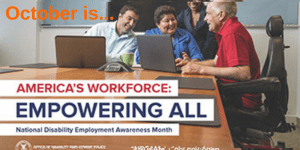
This month, let’s celebrate Colorado’s Employment First efforts and the passage of the 2014 Workforce Opportunities and Innovation Act (WIOA), a strongly bipartisan bill designed to improve employment outcomes for people with disabilities across the country. A significant focus of the bill is supporting transition-aged youth getting off to a good start with a job before they graduate.

What do Employment First (EF) and WIOA mean to you and your family?
Potentially, it means more resources for supported and customized employment. It means, young people with disabilities are now a priority for the Division of Vocational Rehabilitation and those folks with more significant disabilities are a priority, too.
For those you want to dive deeper into the data, the State Leadership Employment Network (SELN) has provided report on Employment First in Colorado. A noteworthy aspect of the report is the whole-hearted commitment of a dedicated group of visionary leaders working to improve employment outcomes for people with disabilities.
Here are a few highlights. To view, the rest of the report click on the link below.
I believe we are on the precipice of important change here in Colorado. And, at the time of this writing, that is a positive change that can potentially improve the quality of life for those with disabilities in Colorado.
“Annual roundtables and online series Colorado’s Department of Health Care Policy and Financing (HCPF) and the Division for Vocational Rehabilitation (DVR) hosted 6 annual regional supported employment roundtables.
Participants including employment providers, school transition coordinators, IDD case managers, and DVR counselors discussed changes in supported employment processes, services, and best practices, such as job discovery and community-integrated employment.
Piggybacking off the roundtable discussions, HCPF, DVR, and the SELN hosted a 4-part webinar series on the importance of building capacity and providing individualized support to lead to community-based jobs.
The sessions included strategies for success on the job, a foundational understanding of individualized supports, getting to know the job seeker, and customized and negotiated job development. Two hundred fifty employment specialists participated in the series.

denver; colorado; denverite; kevinjbeaty; Building staff competencies.
The 2018 Colorado legislative session passed Senate Bill 18-145. The bill mandates that all providers of supported employment services for persons with disabilities earn a nationally recognized certification: the Certified Employment Support Professional (CESP). The HCPF and DVR will implement the new provider qualifications and track compliance. The legislation also provides funding to reimburse providers for the cost of the training and obtaining the CESP certification. It will be implemented by July 1, 2019. As of yet, no established messaging on Employment First exists outside of the DVR website, but other states do. Look at the links below to see how this effort has spread to over forty states across the nation.” –2018 SELN Report
Colorado’s Workforce Innovation and Opportunities Act.
The publicly-funded workforce system is a national network of Federal, State, regional, and local agencies and organizations that provide a range of employment, education, training, and related services and supports to help all job seekers secure good jobs while providing businesses with the skilled workers they need to compete in the global economy.
WIOA’s six core programs are—
- The Adult Program (Title I of WIOA),
- The Dislocated Worker Program (Title I),
- The Youth Program (Title I), · The Adult Education and Literacy Program (Title II),
- The Wagner-Peyser Act Program (Wagner-Peyser Act, as amended by title III), and
- The Vocational Rehabilitation Program (Title I of the Rehabilitation Act of 1973, as amended by Title IV). States have a choice between a Unified State Plan or Combined State Plan.
Colorado has chosen the Combined State Plan. This plan selected the following areas:
- Temporary Assistance for Needy Families Program (42 U.S.C. 601 et seq.)
- Trade Adjustment Assistance for Workers Programs (Activities authorized under chapter 2 of title II of the Trade Act of 1974 (19 U.S.C. 2271 et seq.))
- Jobs for Veterans State Grants Program (programs authorized under 38, U.S.C. 4100 et. seq.)
- Senior Community Service Employment Program (Programs authorized under title V of the Older Americans Act of 1965 (42 U.S.C. 3056 et seq.))
If you get a few minutes, click on the link list above. Most noteworthy to the field of disability is the nearly 30% growth in demand for healthcare support workers. It asks, “Who will support our families when we can’t?”
The good news to celebrate through National Disability Employment Month is that Colorado is making more progress in the last three years than in the last twenty. What does the future hold? I guess it depends on how good we are at planning and actively advocating for a rich and meaningful life.
